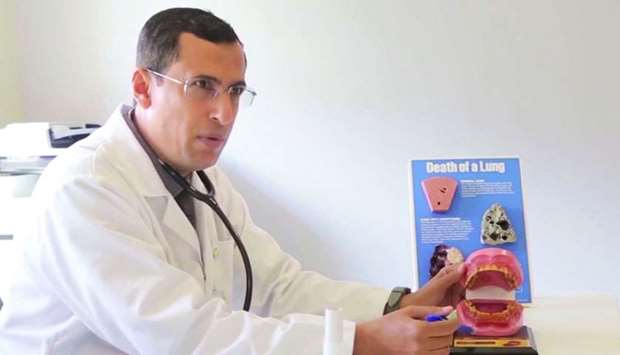Hamad Medical Corporation’s (HMC) Tobacco Control Center is seeing more and more patients who want to stop smoking, with more than 3,600 patient visits to the Smoking Cessation Clinic recorded over the past year. About 40% of those who seek treatment are considered heavy smokers, smoking more than 30 cigarettes a day.
Dr Jamal Abdullah, a smoking cessation specialist at HMC, said that due to the recent inauguration of the new Tobacco Control Center as well as HMC’s anti-smoking awareness programmes, more people are learning about the support that is available to help them quit. This has led to a surge in the number of visits to the Smoking Cessation Clinic.
According to Dr. Abdullah, patients attending the Clinic receive one-on-one counselling and appropriate nicotine replacement or pharmaceutical support. Patients also undergo a full assessment, including a complete medical history and related evaluations, such as lung function tests. As part of the assessment, clinicians talk to patients about available treatment options, which include the most modern and effective solutions to quit smoking.
“Medications such as varenicline and bupropion and nicotine replacement therapies such as gums, patches, sprays, inhalers, or lozenges are prescribed for some patients, particularly those who are considered heavy smokers with severe addictions. Any patient who is prescribed medication is closely monitored and the drug therapy is always prescribed as a short-term solution.” Explained Dr Abdullah
“We recently introduced a new laser therapy treatment which is being used for the first time in the region. Each session takes about 20 minutes and the laser stimulates selected areas of the body, for example, the ears, face, and wrists. It does not cause any pain or negative side effects and so far has proved to be very successful,” said Dr Abdullah.
Psychological support is also a core part of treatment. Smoking is far more addictive than many drugs and according to Dr Abdullah, it isn’t uncommon to see patients who have quit experience a relapse. Mohamed Ahmad, a 42-year-old patient of the Clinic who was able to quit smoking after 20 years, says he understands how addictive nicotine is.
In addition to its work helping individuals, the Tobacco Control Center also educates the public about the risks of smoking. Many of the organisation’s community outreach programmes target young people, as statistics indicate at least 11% of smokers in Qatar are school students under 20 years of age. Dr Abdullah says smoking cessation interventions can help prevent those who don’t smoke from picking up the habit, while also helping teens who do smoke, to stop.
In addition to smoking cigarettes, the most popular forms of tobacco use among young people in Qatar include chewing tobacco and a tobacco product mixed with aromatic leaf and bark herbs. These alternatives can be cheaper than cigarettes and can also be more dangerous with some research indicating that concentrated forms of tobacco can result in the ingestion of a higher dose of nicotine.

